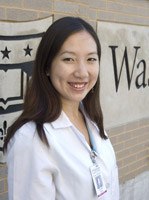
Leana Wen, M.D., a 2007 graduate of Washington University School of Medicine, was selected to travel with New York Times columnist Nicholas D. Kristoff to Africa to observe and write about Africa’s problems as a step toward effecting change. Wen was one of 2,000 who applied and will be joined by a teacher from Chicago. She also has been named a Rhodes Scholar and is past-president of the American Medical Student Association. Wen was selected based on her essay below.
WIN A TRIP Winning Essay: Leana Wen
Published: April 29, 2007 © 2007 The New York Times News Service
If we just looked for them, we can find injustices everywhere. Hurricane Katrina exposed Americans to abject poverty and health disparities right in our backyard. Many more injustices exist “over there,” in developing nations, that result in millions of preventable deaths and lifetimes of wasted talent and squandered opportunity. I want to fight these injustices and change the world.
My upbringing exposed me to injustices first hand. Raised in a dissident family in China, I came to the U.S. on political asylum after the Tiananmen Square massacre. We were outsiders in a Communist regime and remained outsiders in predominantly Mormon Utah and then inner-city Los Angeles. Though Shanghai, Logan and Compton have little else in common, they all bear witness to the differences between the haves and have-nots, and I grew up keenly aware of the impact of political, cultural and socioeconomic oppression. As a child with life-threatening asthma and debilitating speech impediment, I also confronted the stigma of disability and the challenges of seeking healthcare with limited resources.
Yet the mechanisms to address injustices eluded me. I thought that becoming a doctor would allow me to help those most in need; however, I witnessed more problems than found solutions that had sustainable rather than short-term impact. Our H.I.V.-positive patients would receive antiretrovirals, but we would not know if they had food at home to stave off starvation. Our orphans with pneumonia would be cured with antibiotics, but we are not changing their lives of destitution, chronic malnutrition and forced prostitution. Pills might help the individual patients at that point in their lives, but does not resolve the root causes of their problems.
Global change requires more than pills and individual-level change: it hinges on concerted education and mobilization. Today happens to be the anniversary of the 1994 Rwandan genocide, an acute illustration of preventable atrocities that proceeded because of public silence. The scourge of H.I.V. and the conflict in Darfur has had much more media attention, and many more activists are engaged and many more people are pressuring their governments to take action. Short of bringing everyone to Africa to witness conflict and disease, the next best thing is to find ways to communicate to people who otherwise are content to live in our insular worlds.
It is to learn communication to the public as a method of effecting change that I apply for this opportunity. Doctors are natural storytellers who have the privilege of hearing, seeing and experiencing the lives of our patients. I have heard my patients’ stories, and now want to help tell them. Treating a patient’s problems and moving on to the next ailment is not enough, and I want instead to convey my patients’ stories and describe their communities’ struggles. I want to solve global problems by educating and motivating the public to action. I want to learn these tools from you.
Perhaps I am not your typical or even ideal candidate. I am not a journalist. I was born abroad; have had some experiences working in developing countries; and as a Rhodes Scholar-elect and future physician in international health, will seek opportunities to travel and work in other parts of the world.
However, my perspectives are different from and complementary to yours. My life story and experiences working in underserved communities to fight H.I.V./AIDS and advocate for healthcare access may appeal to activists, minorities and youth. I have enough medical training to explain illnesses, but not enough for ailments to become routine or for cynicism to trump idealism.
My overseas experience has been as an aid worker and participant, and now as an observer, I will approach every encounter with fresh eyes. I have written regularly for the medical community, including a blog and a monthly column for The New Physician; my writing to the public will be similarly opinionated and inspired. I will bring to your team incessant curiosity, keen intuition, wry humor, high energy, physical agility and fiery dedication. I aim to make a difference and become a change agent against global injustices; with this experience at The Times, I will have the tools to do so.